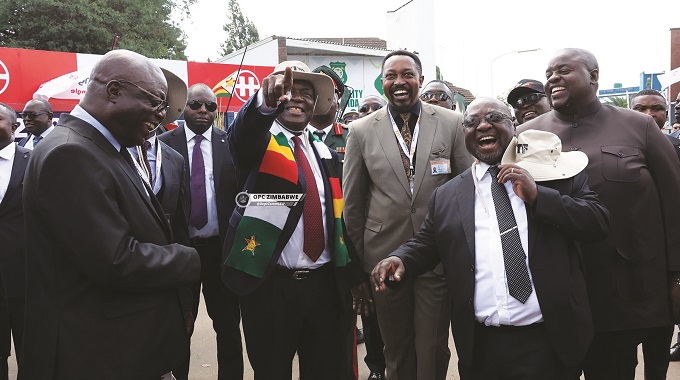Govt launches new livestock programme

Mkhululi Ncube, Chronicle Reporter
GOVERNMENT has launched the $500 million National Livestock Blitz Tick Grease programme meant to fight livestock diseases that will see a million communal farmers getting free dipping chemicals and 4 000 dip tanks countrywide being rehabilitated.
The programme, under the Presidential Livestock Input Programme is anchored on the growth of livestock in the country.
Under the programme every livestock farmer will be provided with 1kg of tick grease for free which will see one million households benefiting, a move that will help transform the quality of the country’s national herd. Yesterday, all chiefs from Matabeleland South province each received a prime bull from Government.
Speaking at the launch of the national programme at Bengo Dip Tank in Gwanda District in Matabeleland South Province, President Mnangagwa who was represented by Vice-President Cde
Kembo Mohadi said the programme is centred on strict tick regulation with strategies to implement robust sustainable animal diseases control mechanism.
“The Government of Zimbabwe has embarked on a rigorous control effort centred on strict tick regulation. It has come up with strategies to implement robust sustainable animal diseases control mechanism among other programmes. Through the Ministry of Lands, Agriculture, Water, and Rural Resettlement, Government has developed agriculture and food system transformation strategies where Pfumfudza/Intwasa is housed as well as the livestock growth plan,” the President said.
Cde Mnangagwa said livestock growth plan was aimed at improving animal health, that is, disease prevention and control.
He said it further entails enhancing animal nutrition as well as animal breeding and genetics.
“My colleagues in the animal industry, I urge you to embrace this programme. It is important. Let’s us work close with our crops and livestock officers so as to protect and improve our breeds,” said President Mnangagwa.
He said the programme is also aimed at growing the national herd which has been depleted by drought and diseases in the past years.
“This tick grease programme we launch today is one of the critical elements of the livestock growth plan by your Government. The milestone tick grease programme runs under the Presidential Livestock Input Scheme and will cascade to all other rural provinces. This tick grease plan we are launching for the resuscitation of dip- tanks and genetics improvement of our livestock include putting in place a well-thoughtout feeding scheme for our livestock,” said The President.
He said the new strategies being put in place under the Second Republic are all to make sure that the country`s livestock growth plan bears fruit.
“Our vision for a prosperous upper middle-income economy by 2030 will not be possible without such sector specific strategies such as the livestock growth plan we have witnessed here. We realize too well that agriculture is the backbone of Zimbabwe`s economy. It provides us with food and livelihoods. Agriculture creates employment and provides raw materials for upstream and downstream Agro- industries. It is on this basis that we derive comfort in prioritizsng investment in Agriculture,” said the President.
He said communal agriculture and in particular crop production heavily depends on livestock for drought power and for tillage which further contributes to the household food security which is the main thrust of the Second Republic.
President Mnangagwa said some of the diseases affecting cattle in the country were imported into the country when former white farmers brought cattle from other countries.
‘It is unfortunately that our former colonisers in their quest to boost the national herd imported cattle from Kenya and Tanzania in 1901. Little did they know that in the process they also imported a disease called the East Coast fever now commonly known as the January disease. They further imported a further 1 000 cattle from Australia in the same year which all later died from the tickborne disease with only three remaining. Tickborne disease is not indigenous to Zimbabwe but was brought into the country by former colonisers, “he said.
The President said the need for improved animal health cannot be over emphasized.
He said the country needs a health herd so as to boost Zimbabwe’s export earnings and bolster national food and nutritional security.
“Thus, the livestock growth plan is underpinned by production, productivity and profitability,” said President Mnangagwa.
He urged farmers to use tick grease in conjunction with other traditional methods of fighting diseases such as dipping.
“We are going to rehabilitate the 4 000 dip- tanks dotted all over the country so that over and above the application of tick grease you also dip your animals regularly. This is the reason why we are also commissioning the rehabilitated dip- tank here and cattle handling facility. We want each and every farmer to complement Government efforts by coming up with such handling facility at their homes,” said Cde Mnangagwa.
The function was also attended by Land, Agriculture, Water, and Rural Resettlement minister Dr Anxious Masuka, Matabeleland South Provincial Affairs Minister Abednico Ncube, the Minister of State in Vice President Constantino Chiwenga`s office Cde Evelyn Ndlovu, senior Government officials and traditional leaders as well as local farmers.
@themkhust










Comments